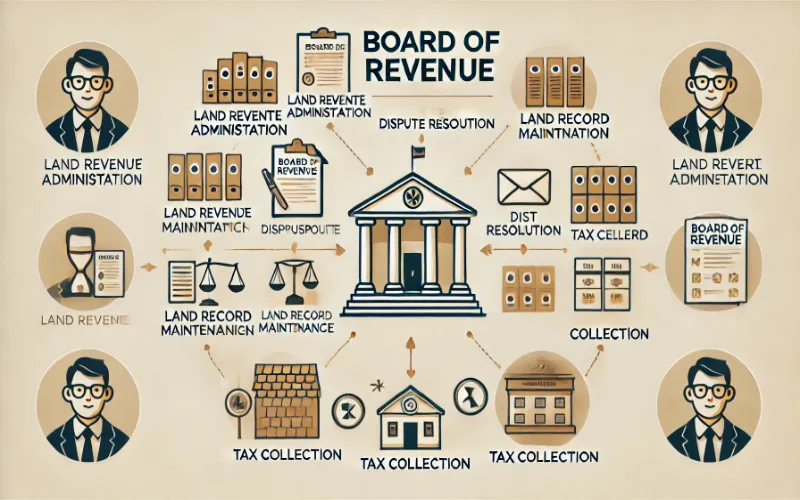The Board of Revenue is a fundamental pillar of land administration, playing a crucial role in governing land-related matters within a jurisdiction. It functions as the highest revenue authority in many countries, ensuring that land revenue policies align with governmental frameworks and public welfare.
Historically, land revenue administration has been the backbone of governance, dating back to ancient times when agrarian economies relied heavily on land taxation. Over time, the role of the Board of Revenue has expanded beyond mere tax collection, encompassing land record maintenance, dispute resolution, and policy formulation.
Effective land administration impacts urban planning, agricultural development, and economic stability. By maintaining structured policies and overseeing local revenue officers such as Patwari, Tehsildar, and Kanungo, the Board of Revenue ensures a smooth and transparent land governance system.
Key Functions of the Board of Revenue
Following are the few functions of board of revenue:
1. Land Revenue Collection and Assessment
One of the primary duties of the Board of Revenue is the collection and assessment of land revenue. This function involves evaluating land productivity, determining tax rates, and ensuring timely collection from landowners. The revenue generated contributes significantly to public infrastructure and development projects.
The Tehsildar, as a crucial revenue officer, plays an essential role in overseeing tax collection at the tehsil level. Ensuring fair assessment and preventing landowners from undue financial burdens falls under the purview of this administrative authority.
2. Maintenance of Land Records and Property Registration
Land records serve as the foundation for ownership rights and property transactions.
- The Board of Revenue supervises the meticulous maintenance of these records, ensuring transparency and authenticity in land ownership documentation.
- The Patwari, stationed at the village level, is responsible for updating and managing land records. Their records play a vital role in legal property transactions and dispute resolution. Meanwhile, the Kanungo acts as a supervisory officer, verifying the accuracy of records and ensuring compliance with legal frameworks.
3. Resolution of Land Disputes and Legal Matters
Land disputes are a common occurrence due to inheritance claims, encroachments, and unclear boundaries.
- The Board of Revenue, through judicial and administrative mechanisms, facilitates dispute resolution.
- Special revenue courts, under the jurisdiction of Tehsildars and higher revenue officials, handle these cases efficiently.
- The authority also plays a crucial role in enforcing land-related laws, ensuring fair and lawful property ownership rights.
By addressing grievances promptly, the Board prevents prolonged litigation and unnecessary distress among landowners.
4. Policy Formulation and Implementation
The Board of Revenue not only enforces existing land policies but also formulates new regulations to meet evolving socio-economic demands. These policies cover areas such as land redistribution, tenant rights, and sustainable land use.
Additionally, revenue officials conduct surveys and research to propose reforms that enhance the efficiency of land administration. By integrating technological advancements like digitized land records, the Board improves accessibility and reduces bureaucratic hurdles.
5. Disaster Management and Relief Distribution
In times of natural disasters, such as floods, earthquakes, or droughts, the Board of Revenue assumes a pivotal role in relief efforts.
It assesses the extent of damage to agricultural land, compensates affected farmers, and allocates resources for rehabilitation.
Revenue officials, including Patwaris and Tehsildars, conduct ground surveys to evaluate losses and distribute relief packages accordingly. Their prompt action ensures that affected communities receive timely assistance and financial aid.
Challenges and Future Prospects of the Board of Revenue
Despite its structured framework, the Board of Revenue faces several challenges, including:
- Land Record Digitization: Transitioning from manual to digital records remains a slow process, with rural areas lagging behind in technology adoption.
- Land Disputes and Encroachments: Unresolved conflicts over land ownership continue to burden revenue officials, requiring legal reforms and alternative dispute resolution mechanisms.
- Corruption and Bureaucratic Delays: The involvement of multiple layers in the administration often leads to inefficiencies and delays in land-related procedures.
However, the future holds promising advancements. Governments are increasingly adopting GIS mapping, blockchain technology, and online land registration portals to enhance transparency and efficiency. By integrating modern solutions, the Board of Revenue can significantly improve its service delivery and governance mechanisms.
Conclusion
The Board of Revenue is an essential institution in land administration, governing revenue collection, record maintenance, and dispute resolution. Through the coordinated efforts of Patwaris, Tehsildars, and Kanungos, land management remains structured and transparent.
As technology reshapes governance, the future of the Board of Revenue lies in digitization, efficient dispute resolution, and proactive policy-making. Strengthening land administration not only benefits property owners but also contributes to economic stability and national development.



Leave a Reply